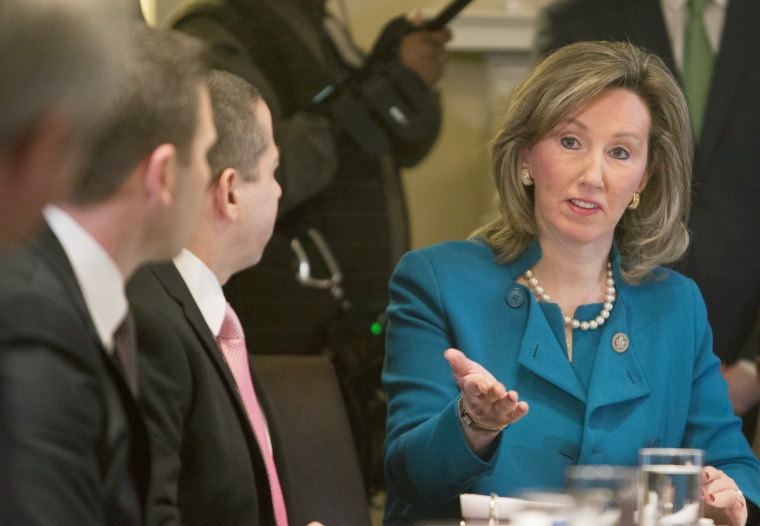WASHINGTON — For a Republican with strong ties to the NRA like Rep. Barbara Comstock, R-Va., being viewed as a gun-rights advocate has been considered a strength in the past, not a vulnerability.
While polls typically show a majority of Americans supporting some level of gun regulation, pro-gun advocates, including NRA members, have traditionally been more energized on the issue come election time.
But in the wake of the Parkland shooting and the national movement that has followed, gun control supporters hope they can change that dynamic in this year's midterm elections, starting with Comstock’s district in northern Virginia.
At least half a dozen Democrats are vying for the nomination to take on Comstock in November and a number of them have been making gun control centerpieces of their campaigns.
For example, business strategist Dan Helmer highlighted gun violence in one of his first digital ads titled “Not in America.” The ad shows Helmer’s wife Karen, an elementary school teacher, leading children in an active shooter drill in a classroom, covering their heads with their arms. “Weapons of war don’t belong on American streets,” says Helmer, a veteran of the wars in Afghanistan and Iraq.
Another Democrat candidate, anti-human trafficking activist Alison Kiehl Friedman, sent a message to supporters shortly after the Parkland shooting explicitly making the connection to America’s gun laws. “We can’t simply mourn a tragedy, disconnected from our national politics, because this tragedy was made by our national politics,” she said.
And Virginia Democratic state senator Jennifer Wexton, told the state's General Assembly in February, “we may not be able to stop all the school shootings but shouldn’t we at least try to stop some?"
Virginia’s 10th congressional district — which Hillary Clinton carried by 10 points in 2016 — sits within a rapidly changing slice of the state. Less than an hour’s drive from the Washington, DC, it includes wealthy suburbs in the east and rural Virginia countryside in the west.
Once reliably Republican, the area has a large population of college-educated, white-collar workers — the kinds of voters that have turned away from the NRA.
In the April 2017 NBC News/Wall Street Journal poll, suburban residents had a net positive view of the NRA — with 41 percent viewing it favorably and 36 percent holding a negative view. But in last month’s NBC/WSJ poll, conducted after the Parkland shooting, more suburbanites had a negative view of the NRA (40 percent) than a positive one (38 percent).
The poll also found that the percentage of white college-educated respondents viewing the NRA favorably dropped from 33 percent in 2017 to 23 percent now.
Mark Rozell, dean of the Schar School of Policy and Government at George Mason University, said the confluence of demographic changes and current events spells serious trouble for Comstock.
“It’s almost a perfect storm against her,” said Rozell.
Comstock has come under increased scrutiny for her close ties to the NRA. She carries an A-rating from the organization, and rounded out a list of the top ten biggest recipients of NRA contributions in a list published by the New York Times in October.
One Republican operative familiar with the race said that while Democratic candidates were trying to make a liability of the gun issue, Comstock’s recent vote for the omnibus spending bill was significant.
That bill included provisions incentivizing increased background checks, and explicitly stating the authority of the Centers for Disease Control and Prevention to research the causes of gun violence. Some have called those provisions modest and questioned their effectiveness, however.
“The other candidates can talk a big game, but Barbara Comstock is the only one who’s done anything to change it,” said the operative, who is not directly associated with the campaign and not authorized to speak publicly about it. “A lot of conservative Republicans didn’t vote for the omnibus bill because of that.”
Rozell said Comstock has held on to this seat despite shifting demographics in part because she’s taken positions that appeal not just to conservative voters but also to some Democrats and moderates in the region, especially among federal workers.
In 2017, Comstock co-sponsored the Federal Employees Paid Parental Leave Act, which would have provided six weeks of paid parental leave to federal employees. She also broke with the Trump administration over the federal hiring freeze announced in January 2017.
“She’s been seen as a strong bulwark in defense of federal workers,” said Rozell.
Comstock has also been careful to draw contrasts with President Donald Trump at key moments.
After the release of the infamous Access Hollywood video in 2016, Comstock called then-candidate Trump’s behavior “disgusting” and “vile” and called for him to drop out of the race.
At a February White House meeting in which Trump expressed support for a government shutdown to force a compromise on MS-13 legislation, Comstock confronted the president as cameras rolled. “We don’t need a shutdown over this” she said directly to him. “I think both sides have learned that a government shutdown was bad. It wasn’t good for them.”
Still, Comstock’s record is conservative, and she has voted in alignment with the Trump administration the majority of the time.
Rozell said that although the combination of changes in the district and increased energy behind gun-control advocates make Comstock vulnerable, the relative youth of those advocates gives him pause. He points out that young voters continue to be among the most difficult to turn out at the polls, and if turnout among those voters isn’t high, Comstock could survive another term.
“I don’t count her out,” said Rozell.
